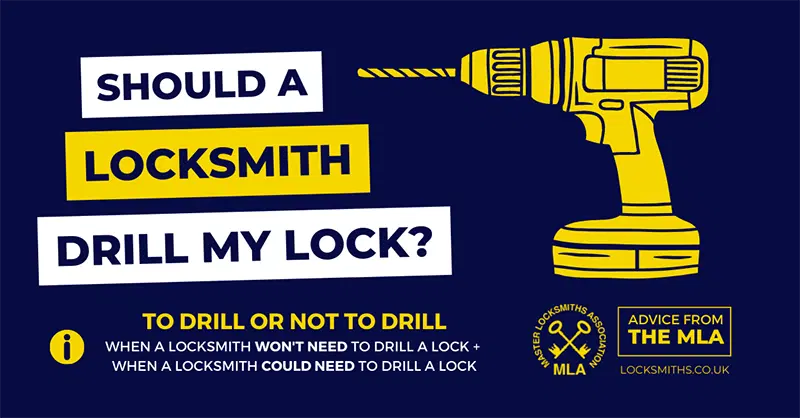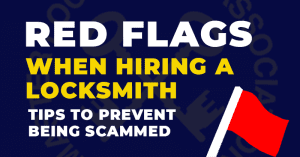Should a Locksmith Drill My Lock? (When to Drill a Lock & Not to)

Have you recently hired a locksmith & the locksmith drilled your lock to gain entry to your house as you were locked out, or your door lock was broken?
Find out the scenarios when it is acceptable for a locksmith to have drilled a door lock, and when a locksmith really should not be using a drill.
1. Should a Locksmith Use a Drill on my Lock?
There are instances when a locksmith has to drill a lock such as when the lock is broken, however drilling a lock should not be the first attempt, we would expect a locksmith to try non-destructive methods first and only use a drill as a last resort.
A professional Locksmith will have various tools and the knowledge to apply specialist techniques first, before drilling a lock.
We recommend always using a skilled & vetted MLA Approved locksmith that has the skill set and knowledge to know when not to drill + when drilling a lock is required as a last resort.
2. When Will a Locksmith Need to Drill a Lock?
There are various scenarios a locksmith may need to a drill a lock, below are some examples :
- Lost Keys with Lock Replaced – if the customer has lost their house keys and the lock needs replacing anyway, then drilling can be used as the old lock will be replaced anyway.
- 3 Star Diamond Lock without correct Lock Pick – If the door lock is a 3 star diamond standard lock and locksmith does not have the correct lock pick on the van.
- No Feel in the Lock – If when trying to pick or bypass there is no feel in the lock, then the lock may need to be drilled or attacked to open.
- Lock Mechanism Failed – If the lock has failed or attacked & is fully locked or doubled locked, the locksmith may need to drill to open the lock.
- Last Resort – If the locksmith has tried to pick, bump, rake, bypass and all has failed then drilling the lock is a last resort normally.
3. When Will a Locksmith NOT Need to Drill a Lock?
Most MLA Approved Locksmiths are skilled enough to pick, bump, rake, bypass a lock to get a customer back in without the need to drill a lock.
A locksmith will not always need to drill your lock in various scenarios, for example:
- Locked out Keys in Back of Door – rather than drill, the locksmith will use a variety of non-destructive techniques.
- Lost Keys or Lock out – instead of drill the lock, the locksmith might find another entry point easier to open than the one in question.
- Night latch Lock Out – instead of drilling a night latch lock, a locksmith has a number of expert techniques to open the lock without damage.
- Euro Thumb Turn Cylinder Lock Out – the locksmith can open a euro thumb using non-destructive locksmith methods.
4. Will Drilling through a lock open it?
Drilling through a lock will definitely not open the lock, a lot of modern locks are actually designed to combat drilling, or snapping, therefore drilling should be considered the last thing to ever attempt.
When drilling a lock, this can cause further issues like damaging the locking mechanism inside the door that ultimately makes the job even more expensive replacing more parts.
A Professional locksmith will be able to identify the lock in question, establish where to drill and how to then open the lock with minimal damage.
5. Why do Rogue Locksmiths Immediately Attempt to Drill Locks?
A rogue locksmith will use drilling as the first attempt, as the exact intention of a rogue Locksmith is to inflate the price by damaging the lock.
After drilling a lock, the invoice produced by a rogue locksmith will include lots of items to inflate the cost, such as a) labour to drill b) labour to fit a new lock.
Multiple item charges after drilling is a massive indication that you could be being overcharged, as the labour is usually one item while you are on site.
